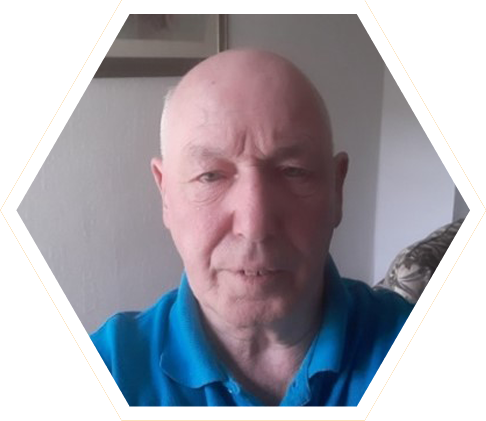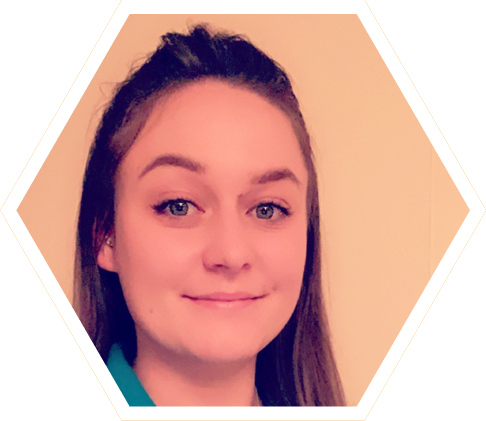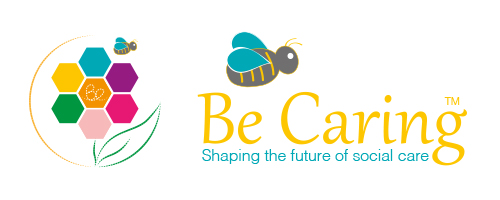
”Every one of our amazing colleagues owns part of Be Caring – an equal share. What that means, is you benefit from the financial rewards that come with that. You can bring feedback, you can design how our services are run, and we want you to feel part of the organisation. We want you to feel like you have a voice and that you are listened to”
Voice – bringing employee-ownership to life
Being part of Be Caring isn’t like working at a regular care company. The reason being that our colleagues own the organisation, and it’s also a social enterprise. This means that Be Caring invested in the communities where we operate and aim to make a genuine and lasting difference in the areas where we operate. Colleagues have a say in how the organisation is run, are taken seriously and encouraged to take positive steps toward working together and finding solutions.
“Voice” is our elected forum with representatives from across the organisation, from every role and location where we operate. It consists of members from each service location representing the priorities and wellbeing of colleagues and the people who we support. Voice holds our management to account and its Chair, Bronwyn Burgess, is an observer of The Board. Voice is the vehicle for representing and hearing the voice of our employee-owners, our colleagues. Ultimately, being employee-owned and having Voice, means that we:
- Are creating a culture of equality and reciprocity: understanding that while everyone has different roles – we are all co-owners and have shared objectives and purpose, to deliver high quality care – we all want to get it right and contribute to the success of the organisation
- Create a safe space for colleagues to raise and discuss issues: identifying and proposing potential solutions that result business change, which could include operational process changes
- Design how services are run and care is delivered: colleagues are empowered, and confident, to make safe decision about individual care services, to know what is best for the person they’re supporting and request relevant changes to make improvements and support people to live fulfilled lives
- Investing in our colleagues: paying for extended induction and DBS, additional training with our training partners, developing a career pathway and utilising our Apprentice Levy to upskills and empower our colleagues
- Recognise and reward our colleagues: rather than rewarding shareholders, any surpluses are retained, re-invested, or used for gift vouchers on birthdays and for an annual bonus and to say thank you for their hard work and dedication.
Some examples of how our colleagues have co-designed solution, have been recognised and rewarded, and have been involved in key decisions, include:
- Re-branding our company, the mission, vision and values, through workshops
- Holiday accrual and mileage, which led to consultation to ensure fairness across the business and increased mileage for Carers immediately – we now pay 40p per mile for all mileage
- Above and Bee-yond, colleague of the month nominations and awards, including gift vouchers
- Investment in the EAP, provided by Health Assured, recognising the importance of colleague wellbeing
- Rewarding colleagues with gift vouchers
Our priorities over the next 12-18 months is to:
- Bring Employee-Ownership to life through local Voice champions who will support fellow colleagues, the people we support and the communities we serve through Voice Champions, who will support the work of the nominated Voice Reps
- Develop local and strategic partnerships that will enable us to strive for better terms and conditions by campaigning at a local and national level with the GMB, which will see the publication of an Ethical Home Care Commissioning Charter
Supporting Our Colleagues
As an employee-owned social enterprise, we want to ensure our colleagues are safe, protected and that we invest in training learning and development so everyone can Be the Best they Can Be. We are a “people first” organisation. Every penny we generate goes back into improving the business for everyone who’s connected with it.
Our Colleagues: Meet John

John Halliday
Support Worker
“There are some people in care who think it’s an easy job
and it’s not.” – recently retired, John looks back over a long and varied career in the care sector
I started caring for people in 1995 as a mental health volunteer doing 16 hours a week. The role was to help get people reacquainted with what we’d consider ‘every day’ stuff. Things like getting on the bus or going to the pictures. In those days there wasn’t sufficient infrastructure to support people with mental health problems, so they relied on volunteers.
I was told to use my life experience to help people along. It was really good from a personal point of view. At that time of my life, being responsible for someone else gave me a lot of self-confidence. It was very rewarding, but still only voluntary. I wanted to get a paid job. I ended up doing my NVQ with a placement and got taken on in an elderly care home for people with Alzheimer’s. While I don’t regret my time there, it’s not something I’d do again. It was very hard work and I wasn’t particularly suited to it.
I was also working as a mental health bank nurse at the same time, which I found very stressful. I was doing so many hours a week I ended up feeling overworked, and while I enjoyed both types of jobs – the mental health and care work – I was coming to the end of my time juggling both. I decided to pursue other opportunities for a while. I went on to work as a barman and a manager. I’ve also worked in marketing and owned a pet shop – so you could say I’ve had quite a varied career!
It wasn’t until 2014, after the financial crash, that I found myself looking for work again. I felt confident that I then had more life experience and so could balance my work and home life better.
After sending my CV out to various care providers, I was taken on by CASA (as we were called at the time) as a care worker in Complex and Palliative. It felt like a better time for me to be a care worker than before.
It felt like that was when my life experience really came in useful.
I had a seizure 6 years ago which quite frankly nearly killed me, but it gave me a lot of perspective on life. I found that I was good at working in Palliative because I didn’t fear death and was more comfortable talking about it than most people. When I was speaking to the families, I could say the right thing and mean it. It sometimes helps if you can share personal experiences like that.
Having the seizure gave me a tonne of insights into what’s important in life. I used to be a tremendous money worrier and now I see how trivial it is. You come into the world naked and naked you go out. In Palliative care, you’re often only with people for a few weeks, but you can still make a real difference to someone’s life.
Sometimes, families would invite me to the funeral of their loved one, often sending me a handwritten card saying, ‘thank you so much for the care you’ve provided’. It means a lot when that happens.
I’ve recently retired and looking back, think I’ve had a really varied career. It’s the people I’ll remember the most.
A young man I supported for 3 years couldn’t communicate verbally and was unable to leave his bed. I remember one day he started laughing at something I said and I realised what a brilliant mind he had, (and not just because he was laughing at my joke!) I understood he was an individual person who could still experience things and communicate, just in other ways. He was visited by a behavioural specialist and I was very involved in that care plan. From then on, being compassionate and open to how he wished to communicate really helped.
Think carefully about it. Do you have the right attitude? Are you empathetic to other people’s needs? When I was in my 20’s, I think it’s safe to say I wasn’t as empathetic as I am now, so life experience definitely helps. Saying that, I’ve met some lovely younger people (some were studying psychology) who were very knowledgeable and seemed to have the right mindset for the job.
Our Colleagues: Meet Rebecca

Rebecca Turner
Support Worker (Tyneside)
Started April 2020
“I’d love to start university one day and go into social work. I think I’m perfect for that sort of job and I’ll have also had the experience of working in care. I often speak with social workers on the phone and so have an idea of what their job might be like.”
One of my friends was a support worker for a different company and told me all about working in care. Back then I was ready to change jobs and go down a new career path.
I was working in a spa doing massage and nails – beauty therapy type work – and in the past I’ve also done hairdressing. Massaging people all day is obviously very hands on and I got a repetitive strain injury. I had to give up on that as my hands kept swelling up, though it wasn’t really something I wanted to do for the long haul anyway. It’s only now that I’ve started to know what I want to do! So, after speaking with my friend, I started looking into it and came across the job here.
Really easy! I think considering I hadn’t done this before I started and had come from doing massage, I think I fit in really well. It feels like I’ve been doing it my whole life. I think I’m probably using some of the skills from what I was doing before. In the spa, I met and talked to loads of different people every day. I was also trained in cancer wellness – we did massages specifically for people with cancer which meant changing the routine, so you didn’t work towards lymph nodes. It was more therapeutic. Sometimes I had quite sick patients coming in and had to adapt to their needs.
That I’m doing good and helping people. I like to help people get their independence back and to have a better life. It just feels good to give whatever they need.
As part of the Life team, I work with people who have learning disabilities like autism or down syndrome. Sometimes I help by doing the personal side of care, but I also take people out in the community and help them live independently in their own home.
I completed my NVQ Level 2 in Health and Social care, which I started at Sunderland College last year in September. I’m not a sit in the classroom sort of person, so I was glad it was mostly learning from home. I get to use the things I’ve learned in a practical way – I’m hands on and learn better by doing something.
I had a support from a college tutor on anything I wasn’t sure of. We’d meet somewhere easy for both of us, like a coffee shop, every other week and go through the work together. If there was anything I needed help with, the tutor would explain and then I’d go off and do it myself. I found that really good because I was able to be at home, research what I needed to research and do it at my own pace, rather than stress about getting things done by a certain time. It’s also been nice having the college tutor at the end of the phone, so if I did have a question, all I had to do was text her and she’d text me back. She was fine with that. It was good to learn that way rather than in a classroom.
I’m just about to start my NVQ Level 3 in Health and Social care (it was postponed from March because of the pandemic). I’d love to start university one day and go into social work. I think I’m perfect for that sort of job and I’ll have also had the experience of working in care. I often speak with social workers on the phone and so have an idea of what their job might be like. It’s still on the horizon though – it’s something I look forward to and I feel like the office will support me to do this. I also need to do my GCSE maths before I can go on to my university course. My college tutors are helping me with that while I do the NVQ level 3. I’m getting there!
Sometimes I think it’s crazy that I only know what I want to do now. When I look back to when I was 16 and people were asking me what I wanted to do, I wasn’t sure. If anyone back then had told me I would ever be in a situation like this, I’d have said, ‘no way! I’m not clever enough to do that.’ But now even one of my clients says she thinks I’d be good at social work, and I’ll have the care experience as well. It’s nice to hear things like that.
Our Colleagues: Meet Kamran

Kamran Azim
Care Worker (Leeds)
Started April 2020
“I’m not doing this for the money. I came into this field to help people.”
About two years ago one of my friends was diagnosed with colon cancer and MND (motor neurone disease). He was unable to move and struggled to eat or do all the usual things for himself. Whenever I could, I’d help him out by cleaning and cooking – whatever he needed. He spent the last stages of his life in a hospice in Leeds, during which time I continued to visit him regularly, often staying overnight.
I realised he wasn’t receiving the same care as before – the nurses were rushed, and he was left alone for much of the time. He didn’t feel like he could ask for more help, so I offered to visit him and help as much as possible. It killed my heart seeing him so unwell. I thought, ‘I can’t leave my friend alone.’ So, I started going to visit him more – feeding and washing him, that sort of thing. The nurses would ask me if I could spend time talking with the other Asian men on the ward, which I did. I was really enjoying caring for people and it spurred me on to do some voluntary work. I then started to think about care as a career.
My friend died in November last year. It was especially sad as I think he felt like a burden at the end. It made me realise that I wanted to leave my job in banking – a well-paid position at a company I’d been with for 14 years. I’d wanted to leave for a while, but until then hadn’t quite had the courage or a good enough reason to leave.
I left my banking job in March and started work with another care provider, however I was saddened by what I saw as bad practice and immediately started looking for another company.
I applied for a job with Be Caring – I was attracted by it being employee-owned. It’s still a tough job, but I’m enjoying it and am doing better with Be Caring. I’m satisfied.
Sometimes people don’t understand why I chose to give up my career to do a difficult low paid job. I say, ‘I’m doing it for my own satisfaction – I really enjoy caring for others.’ When those people need care one day, they’ll probably be looking for my number!
The people I care for have got to know me and miss me if I’m doing other rounds for a week. People like to keep to their routines. That’s why I do this job. It’s all about the people and the feeling you get when you help someone. I don’t leave until they are satisfied, until I know they’re feeling OK.
I’m not doing this for the money. I came into this field to help people. If I’m not helping people, then I’m not doing this job.
Time management is the main challenge. For instance, I have one client whose care package allows for 45 minutes in the morning – in that time I need to give him a shower and help him get dressed, which isn’t long enough if I’m going to have enough time to talk with him.
I’m currently learning how to be an Assistant Practitioner and look forward to gaining a proper qualification for that. It’s part of a new pilot being run in Leeds that uses a slightly different care model, one that looks at personal goals and outcomes, rather than purely time and task. It fits with my view that care workers should have more say in care plans. For instance, sometimes there is a language barrier which I can help cross as I speak Punjabi, Hindi and Urdu. Care workers have a lot of other skills to offer.
I think Care Workers need more recognition. I’d like to change the perception of care – it’s a really worthwhile job and one that benefits the whole community!

